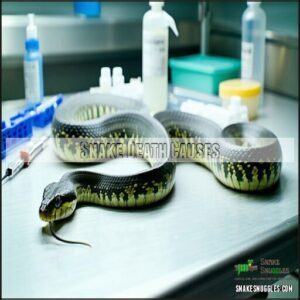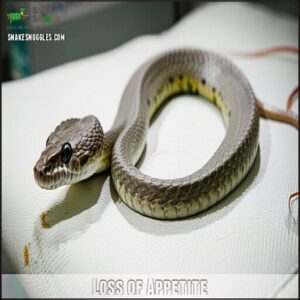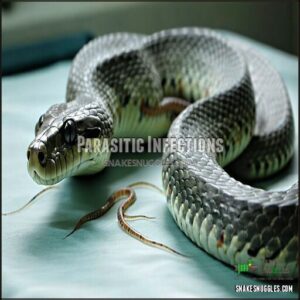This site is supported by our readers. We may earn a commission, at no cost to you, if you purchase through links.

Snakes in captivity often die from illnesses like mouth rot or parasites, which can be indicated by changes in their body or scales. You may have noticed bumpy skin or inflamed scales, signaling a health problem.
Understanding the reasons behind your snake’s death can help you prevent it from happening to other pets. Now, let’s explore the possible reasons behind the question "why did my snake die" and what you can do to make certain your other snakes stay healthy.
This approach will help you identify key issues, such as illnesses like mouth rot, and take preventive measures to ensure your pets’ well-being, ultimately leading to a better understanding of how to keep your snakes alive.
Table Of Contents
Key Takeaways
- You’ll want to investigate the cause of your snake’s death by examining the circumstances surrounding it, and consider a necropsy to identify potential underlying causes, so you can take steps to prevent similar incidents in the future.
- You should monitor your snake’s health closely, watching for signs of illness like loss of appetite, changes in behavior, or physical symptoms, and consult a vet if you notice anything unusual, to prevent illness and ensure your pet’s well-being.
- You can prevent your snake’s death by providing proper care and housing, including a suitable enclosure size, temperature gradient, and humidity levels, as well as a balanced diet and regular veterinary checkups, to create a healthy environment that supports your pet’s well-being.
- You’ll need to take proactive steps to reduce stress and prevent illness in your snake, such as optimizing enclosure enrichment and handling techniques, implementing quarantine protocols, and maintaining a clean environment, to minimize snake stress factors and promote overall reptile health and well-being.
Snake Death Causes
You’re likely searching for answers because your snake died suddenly, and understanding the common causes of death in snakes is vital.
By exploring snake death causes, you’ll learn about natural lifespan, illness, stress, and repetitive behaviors that can affect your pet’s health and well-being.
Natural Lifespan
You wonder about your snake’s natural lifespan.
- Maximum Lifespan
- Aging Signs
- Species Longevity
- Wild Mortality
Snakes can live up to 30 years, with some species exceeding this in captivity, showing signs of old age like grey coloration and reduced appetite, which can be a clear sign of aging.
Illness
You’re dealing with snake death causes, specifically illness.
Common issues include:
| Illness | Description |
|---|---|
| Mouth Rot | bacterial infection |
| Internal Parasites | harmful worms |
| Skin Infections | fungal or bacterial |
| Viral Diseases | fatal diseases |
| Fatty Liver | obesity-related disease |
Stress
Stress can kill your snake.
Improper enclosure size, handling frequency, and temperature gradient can cause snake stress, leading to health problems and sudden death.
So guarantee proper snake care and habitat to prevent brumation stress and social isolation.
Repetitive Behaviors
You notice repetitive behaviors in your snake, such as:
- Pacing
- Hiding
- Vibrating
- Wrapping tightly.
These are boredom signs and stress indicators, hinting at enclosure size issues or lack of enrichment, potentially leading to snake overstress and dying signs, affecting snake behavior and overall well-being.
Why Snakes Die Suddenly
You’re left wondering why your snake died suddenly.
Hidden symptoms can be a major factor, as snakes often don’t show signs of illness until it’s too late. Toxin exposure, feeder risks, and genetic defects can all contribute to sudden death.
Internal issues, like impaction or organ failure, may also be to blame. A snake necropsy can help determine the cause of death.
Be aware of snake dying symptoms, such as loss of appetite or changes in behavior, to prevent future sudden deaths. Regular check-ups and a balanced diet can also help reduce the risk of snake illness and sudden death.
Snake Lifespan Factors
You’re likely wondering what factors affect your snake’s lifespan, and bear in mind genetics, care, and environment.
By understanding these factors, you can better determine why your snake died suddenly and take steps to prevent similar incidents in the future, considering complete concepts that influence the outcome.
Genetics and Care
You play a vital role in your snake’s health through genetics and care.
Genetic predisposition affects snake health problems.
Proper husbandry practices and selective breeding impact lineage health, reducing snake care mistakes and illnesses, and recognizing snake dying signs is key to preventing sudden death, which is influenced by genetic predisposition.
Environment and Diet
Besides genetics and care, your snake’s environment and diet are essential. An improper snake habitat can cause significant problems.
Enclosure Size matters; too small, and they’re stressed. Temperature Gradient is key; they need warm and cool spots. Snakes also require specific conditions for successful temperature regulation.
- Check Water Quality regularly.
- Be aware of snake feeding issues.
- Source Prey carefully.
Feeding Frequency and Prey Source impact snake nutrition. Proper care and a suitable environment are crucial for the health of your snake, and regular checks on these aspects can prevent many issues.
Health Issues
You face health issues like captive snake illnesses.
| Snake Symptoms | Reptile Diseases | Veterinary Intervention |
|---|---|---|
| Loss of appetite | Parasitic infections | Regular check-ups |
| Changes in behavior | Respiratory issues | Preventative snakecare |
| Physical symptoms | Skin problems | Recognizing symptoms |
Signs of Dying Snakes
You’re likely searching for answers because your snake’s sudden death has left you with questions about what went wrong.
By recognizing signs of a dying snake, such as loss of appetite, changes in behavior, and physical symptoms, you can better understand what might’ve happened and take steps to prevent it in the future, possibly improving your ability to recognize signs.
Loss of Appetite
You notice a loss of appetite in your snake, a common symptom.
- Refusal to eat
- Underlying illness
- Dietary needs
- Environmental factors, can indicate snake health issues, including common illnesses and refusal to eat, signaling potential underlying causes and duration of the problem.
The issues mentioned, including underlying illness, can be crucial in understanding the health of your snake.
Changes in Behavior
You may observe activity changes, such as hiding more, erratic movements, or apathy signs, in a sick snake.
Unusual aggression or quietness can also be signs of illness.
If your snake is slow-moving or refuses to eat, it may be showing signs of underlying snake illnesses. A key indicator is lack of responsiveness to stimuli.
Physical Symptoms
Physical symptoms can be alarming, so be observant. You’ll want to look closely for sick snake signs.
Here’s what to watch for:
- Scale Changes
- Body Lumps
- Breathing Difficulty
- Mouth Examination
- Discharge Analysis
These snake health indicators could signal snake illnesses. Snake dehydration symptoms and snake respiratory infection are also critical. If you see these, consult a vet!
Common Snake Health Issues
You’re likely wondering what could’ve caused your snake’s sudden death, and it’s vital to examine common health issues that can affect snakes.
You’ll want to look out for parasitic infections, respiratory infections, and skin problems, which are common health issues that can be fatal if left untreated, and understanding these common health issues is crucial.
Parasitic Infections
You’re dealing with parasitic infections, a common issue in snakes.
Internal and external parasites can cause harm. Regular fecal analysis and preventative measures can help.
Treatment options are available for snake parasite infections, but early detection is key to preventing serious health issues from internal parasites and reptile parasites.
Effective snake parasite treatments are readily accessible for effective management and prevention.
Respiratory Infections
You’re now dealing with respiratory infections, a common issue in snakes.
Pneumonia can occur, causing breathing difficulty and nasal discharge.
Proper humidity control and antibiotic treatments can help.
For treatment, consider using a reptile breathing aid.
Regular check-ups can prevent snake infections, including bacterial and fungal ones, which are common reptile illnesses.
Skin Problems
You face snake skin problems like shedding issues or scale rot.
- Dysecdysis causes
- Mite infestation
- Blister disease, which can lead to snake fungal or bacterial infections, resulting in bumpy or inflamed scales.
Preventing Snake Death
You can prevent your snake’s death by taking proactive steps, such as providing proper care and housing, and scheduling regular veterinary checkups.
By following these guidelines and maintaining a balanced diet and hydration for your snake, you’ll be well on your way to creating a healthy environment that supports your pet’s well-being.
Proper Care and Housing
You guarantee proper care by providing a suitable enclosure size, temperature gradient, and humidity levels.
Selecting appropriate habitat dimensions is vital for their well-being.
| Safe Substrates | Enrichment Ideas |
|---|---|
| Paper towels | Hiding places |
| Indoor/outdoor carpeting | Climbing structures |
| Astroturf | Sensory stimulation |
The table outlines safe substrates and enrichment ideas to create a stimulating environment.
Regular Veterinary Checkups
You schedule regular visits with a reptile veterinarian for expert advice on snake health.
Early detection through preventative care and health monitoring helps prevent issues, making scheduled visits essential for your snake’s well-being and long life, which is crucial for preventing issues.
Balanced Diet and Hydration
You feed your snake a balanced diet with varied prey, considering nutrient requirements.
- Prey variety
- Hydration methods
- Supplementation needs to prevent obesity and regurgitation, key to a healthy snake diet.
Ensuring proper hydration, which impacts temperature regulation in snakes, is also essential.
Investigating Snake Death
You’re likely searching for answers if your snake died suddenly.
Investigating the cause of death is a key step, by examining the circumstances surrounding your snake’s death, you can identify potential underlying causes.
You can take steps to prevent similar incidents in the future.
Necropsy and Postmortem Exam
You’ll uncover the diagnostic value of a necropsy, or snake autopsy, which involves sample collection for histopathology.
This process helps you understand organ failure and take preventative measures, considering ethical considerations to prevent future snake death.
Identifying Underlying Causes
You’ll need a diagnostic necropsy, or snake autopsy, to identify hidden symptoms, environmental toxins, or genetic defects that may have caused snake death.
Considering feeding risks and common illnesses, to understand reptile health risks and receive proper snake vet care.
Preventing Future Deaths
To prevent future snake deaths, guarantee safe enclosures, follow quarantine protocols, and prioritize feeder safety and temperature control.
Consult experts for personalized snake care tips, minimizing snake health risks with best practices for reptile care, including regular checks and a clean environment.
Caring for Remaining Snakes
You’re likely wondering how to care for your remaining snakes after one has passed away, and this is vital to monitor their health and behavior closely.
By maintaining a safe environment, reducing stress, and preventing illness, you can help guarantee your snakes live long and healthy lives.
Monitoring Health and Behavior
You monitor your snake’s health by observing behavioral changes, feeding habits, and shedding patterns.
Regular enclosure observation helps identify potential risks, such as snake mortality signs, allowing for prompt action to mitigate reptile health issues and recognize snake symptoms early.
Maintaining a clean environment is key, as is proper temperature control to prevent disease.
Maintaining a Safe Environment
You guarantee your snake’s safe environment by avoiding toxic materials, maintaining proper ventilation, and controlling temperature.
Regular cage cleaning is essential to prevent health risks, creating a safe enclosure for your pet, and avoiding common snake care mistakes that can harm your reptile’s habitat and overall safety.
Reducing Stress and Preventing Illness
You can reduce snake stress by optimizing enclosure enrichment and handling techniques.
Implementing quarantine protocols and hygiene practices helps prevent illness.
Proactive healthcare is key to minimizing snake stress factors and common illnesses, promoting overall reptile health and well-being through best care practices, which is essential for reptile health.
Frequently Asked Questions (FAQs)
What to do when your snake dies?
You’ll want to perform a necropsy, consult a vet, and review your snake’s care to understand what happened.
This process will help you prevent future deaths, taking care of yourself too during this difficult time, which is a difficult time.
Do snakes feel pain when they die?
As you wonder, snakes don’t outwardly show pain, making it hard to detect their discomfort, even when they’re dying, due to their natural instinct to hide weakness.
Do snakes move after they are killed?
You’ll notice snakes may still move slightly after death due to muscle spasms or relaxation, but it’s not a sign of life, just a natural post-mortem phenomenon.
Do pet snakes play dead?
You might see your pet snake playing dead, a common behavior, as it remains still, unresponsive, and sometimes flips onto its back to deter predators or express stress.
Why did my pet snake suddenly die?
You’re likely searching for answers, but without a necropsy, it’s hard to determine why your pet snake suddenly died, so consider consulting a veterinarian for professional guidance and support.
Why do snakes die?
Life is a puzzle, and you’re trying to find the missing piece.
Snakes die from various causes, including old age, illness, and poor care, affecting their overall health and well-being suddenly, which can be considered a sudden change.
Is a snake dead for real?
You’ll need to check your snake’s essential signs, like movement and breathing, to confirm if it’s really dead, as snakes can appear lifeless when they’re actually just hiding or stressed.
Is your pet snake dying?
You’re checking if your pet snake is dying, look for signs like lethargy, loss of appetite, or unusual behavior, and consult a vet for professional advice and care immediately.
How long does it take a snake to die?
You’ll find that a snake’s death can occur suddenly, often without warning, and the timeframe varies depending on the cause.
The cause can be illness, injury, or old age, happening within minutes to hours.
Why do snakes die in a tank?
You’ll want to check your tank’s conditions, as snakes can die from improper temperatures, poor feeding, or toxic materials, so guarantee a safe and healthy environment for your pet.
Conclusion
Fast forward to understanding your snake’s demise, you’re now equipped to tackle the question "why did my snake die" by recognizing signs of illness and taking preventive measures.
Ultimately, this knowledge will help keep your pets alive and thriving, so you won’t be left wondering why did my snake die suddenly again, and you can ensure they are thriving.


















